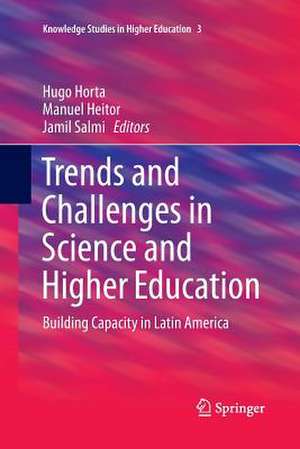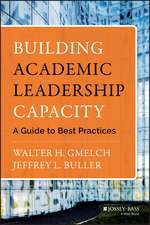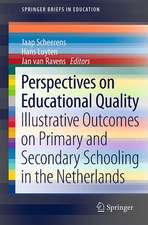Trends and Challenges in Science and Higher Education: Building Capacity in Latin America: Knowledge Studies in Higher Education, cartea 3
Editat de Hugo Horta, Manuel Heitor, Jamil Salmien Limba Engleză Paperback – 28 mar 2019
| Toate formatele și edițiile | Preț | Express |
|---|---|---|
| Paperback (1) | 563.96 lei 38-44 zile | |
| Springer International Publishing – 28 mar 2019 | 563.96 lei 38-44 zile | |
| Hardback (1) | 574.62 lei 38-44 zile | |
| Springer International Publishing – 8 dec 2015 | 574.62 lei 38-44 zile |
Preț: 563.96 lei
Preț vechi: 704.95 lei
-20% Nou
Puncte Express: 846
Preț estimativ în valută:
107.96€ • 111.03$ • 89.57£
107.96€ • 111.03$ • 89.57£
Carte tipărită la comandă
Livrare economică 12-18 februarie
Preluare comenzi: 021 569.72.76
Specificații
ISBN-13: 9783319793245
ISBN-10: 3319793241
Pagini: 310
Ilustrații: XXIV, 310 p. 44 illus.
Dimensiuni: 155 x 235 mm
Greutate: 0.47 kg
Ediția:Softcover reprint of the original 1st ed. 2016
Editura: Springer International Publishing
Colecția Springer
Seria Knowledge Studies in Higher Education
Locul publicării:Cham, Switzerland
ISBN-10: 3319793241
Pagini: 310
Ilustrații: XXIV, 310 p. 44 illus.
Dimensiuni: 155 x 235 mm
Greutate: 0.47 kg
Ediția:Softcover reprint of the original 1st ed. 2016
Editura: Springer International Publishing
Colecția Springer
Seria Knowledge Studies in Higher Education
Locul publicării:Cham, Switzerland
Cuprins
1. Introduction. Democratizing higher education and science in Latin America. M. Heitor and H. Horta, IN+/IST, Portugal.- 2. Prologue I: Engaged development - Homage to Albert Hirschman and Oscar Niemeyer. J.C. Ferraz, BNDES, Brasil.- 3. Prologue II: Everyone For Education - Advocacy for Education in Colombia. Juan David Aristizábal and Victor Saavedra.- Part I: Emerging issues in science and higher education in Latin America.- 4. The scientific productivity and the dynamics of self-organizing networks: Iberoamerican and Caribbean countries (1966-2013). Guillermo A. Lemarchand, Division of Science Policy and Capacity Building, UNESCO.- 5. Towards a Knowledge-based Economy in Brazil. Anne-Marie Maculan, UFRJ, Brasil.- 6. Current Challenges in Higher Education and their Implication for Research and Development in Colombia. Marta Losada, Universidad Antonio Nariño, Colombia.- 7. Internationalization of Chinese higher education in Latin American Campuses. Jae PARK.- 8. The academic profession in Latin America: between a corporatist and a professional ethos. Elizabeth Balbachevsky, University of São Paulo, Brazil.-Part II: Policies and instruments to foster scientific capacity.- 9. On the processes of technical change and development in Latin America: a proposed framework of analysis. L. Lepratte, Facultad Regional Concepción del Uruguay – UTN, Uruguay.- 10. Research assessment of public
research centers in Mexico: an instrument of science policy. S. Estrada and Aguirre, Universidad de Guanajuato, México.- 11. Promoting research careers in the business sector: assessing public policy instruments in Brazil and Chile. E.A. Arancibia Gutiérrez, F. Chaves do Couto and Silva Neto, Universidade Estadual de Campinas, Brazil.- 12. Itaipu Technology Park, a territorial development tool. Juan Carlos Sotuyo and Maria Angélica Jung Marques, Itaipu Technology Park Foundation.- Part III: Networking and Industry-science relationships.- 13. On the dynamics of industry-science relationship: Brazil 1980-2012. E. Stal and A. Fujino, PGT/Universidade de São Paulo, Brazil.- 14. On the evolution of research networks: the case of micro technologies in Mexico. E. Robles-Belmont, Instituto de Investigaciones en Matemáticas Aplicadas y en Sistemas, Universidad Nacional Autónoma de México.- 15. Research networks and the relevance of higher education: lessons learned from veterinarian sciences in Argentina 2006-2010. F. Di Meglio, L. Mayoral y J. Araya, Centro de Estudios Interdisciplinarios en Problemáticas Internacionales y Locales (CEIPIL), Argentina.- Part IV: New horizons for scientific and higher education development in Latin America.- 16. Looking forward: Building capacity in Latin America. M. Heitor, H. Horta, J. Salmi.
research centers in Mexico: an instrument of science policy. S. Estrada and Aguirre, Universidad de Guanajuato, México.- 11. Promoting research careers in the business sector: assessing public policy instruments in Brazil and Chile. E.A. Arancibia Gutiérrez, F. Chaves do Couto and Silva Neto, Universidade Estadual de Campinas, Brazil.- 12. Itaipu Technology Park, a territorial development tool. Juan Carlos Sotuyo and Maria Angélica Jung Marques, Itaipu Technology Park Foundation.- Part III: Networking and Industry-science relationships.- 13. On the dynamics of industry-science relationship: Brazil 1980-2012. E. Stal and A. Fujino, PGT/Universidade de São Paulo, Brazil.- 14. On the evolution of research networks: the case of micro technologies in Mexico. E. Robles-Belmont, Instituto de Investigaciones en Matemáticas Aplicadas y en Sistemas, Universidad Nacional Autónoma de México.- 15. Research networks and the relevance of higher education: lessons learned from veterinarian sciences in Argentina 2006-2010. F. Di Meglio, L. Mayoral y J. Araya, Centro de Estudios Interdisciplinarios en Problemáticas Internacionales y Locales (CEIPIL), Argentina.- Part IV: New horizons for scientific and higher education development in Latin America.- 16. Looking forward: Building capacity in Latin America. M. Heitor, H. Horta, J. Salmi.
Textul de pe ultima copertă
This book discusses the role that integrated science and higher education policies may play in further democratizing and promoting social-economic development in Latin America. It suggests that such democratizing and development may be achieved in two complementary ways: i) broadening the access to knowledge through formal learning processes of higher education, and ii) promoting the advanced qualification of people while strengthening research institutions. The book shows how this entails a complex process of policy integration, with an emphasis on human resources and institutional issues combined in processes of technical change. It discusses in detail the three main challenges that most Latin American countries face in a globalized age, based on knowledge and ever-evolving learning processes. These challenges are the need to broaden the access to higher education; to make this access more socially balanced; and to recover from a long gap in investing in knowledge production and dissemination. This book treats these issues from a variety of conceptual and methodological perspectives that present a contribution to the field of science policy and higher education studies, and inform policymakers in Latin America.
Caracteristici
The first volume to focus on science and higher education in Latin America as a whole Presents perspectives that give direction to policy-making in Latin America Discusses fundamental issues and challenges of science policy Provides an encompassing analysis of multi-level relations in Latin America Brings the important issue of institutional diversity in higher education to the Latin American context





















